Iranians In US, Europe Hold Rallies For Tehran's Political Prisoners
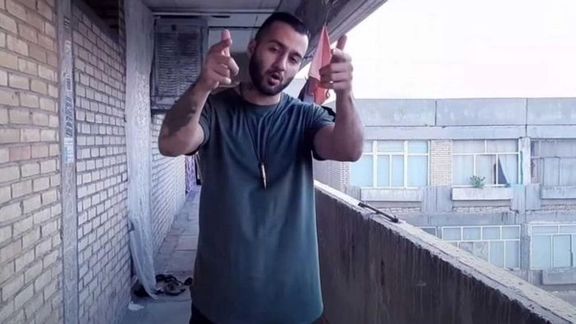
Iranians abroad are holding rallies across Europe and America in support of rapper Toomaj Salehi and other political prisoners.

Iranians abroad are holding rallies across Europe and America in support of rapper Toomaj Salehi and other political prisoners.
After a demonstration in the US on Saturday, protests took place on Sunday in London, Paris, Stuttgart and Antwerp and other European cities. A rally is also planned in Toronto, Canada.
At Saturday’s rally in Washington DC, protestors called for the release of political prisoners, including dissent rapper Toomaj Salehi. They also chanted slogans demanding an end to Iran’s current bloodthirsty execution spree.
In Iran, protestors expressed support for Salehi by putting up his pictures on walls in Tehran and the Kurdish city of Sanandaj.
Salehi is known for his protest songs about Iran's social issues and injustice by the government. He was arrested on October 30 as part of the crackdown on opponents.
His arrest came shortly after an interview with the Canadian Broadcasting Corporation in which he said: “You are dealing with a mafia that is ready to kill the entire nation... in order to keep its power, money and weapons.”
In his politically charged songs such as “Buy a Rat Hole” (2021), Toomaj, a 32-year-old metalworker in Esfahan, speaks out against repression, injustice, poverty, and the authorities’ own corruption and impunity from prosecution.
The 33-year-old singer is one of dozens of members of the artistic and entertainment community who have been arrested since protests surged across Iran last year as the regime struggles to contain widespread discontent.

A French citizen released by Iran after three years in jail on trumped-up spying charges is “very weak”, his family have revealed.
President Emmanuel Macron announced on Friday that Benjamin Brière is going free along with fellow Frenchman Bernard Phelan.
The two men are among an unknown numbers of diplomatic hostages held by the regime.
In a statement on Friday, Briere’s family spoke of being able “to hold him in our arms after three years of hell," but added: “He is, however, very weak, physically and morally, a return to normal life will be long and certainly difficult, but now he is in good hands."
A lawyer for Briere said he had become “extremely weak and frail” after a hunger strike, adding: “If the release wouldn’t have happened by now, Benjamin would be at a major life risk.”
Macron tweeted: "We will continue to work towards the return of those of our fellow nationals who are still detained in Iran."
Brière had been held in Iran since May 2020. The traveller and blogger was arrested for allegedly taking photos with a drone in a restricted area near the Turkmenistan-Iran border and sentenced to eight years in jail.
Philippe Valent, his France-based lawyer, called the espionage charges against his client a "fiction" and his trial "a parody staged by the Revolutionary Guard".
Ties between France and Iran have deteriorated in recent months. Tehran had detained seven French nationals in what Paris described as arbitrary arrests equivalent to state hostage-taking.
In the past decade, Iran's Revolutionary Guard have arrested dozens of dual nationals and foreigners, mostly on unproven allegations of espionage and breach of security.

An Iranian protester, who was shot during last year's protests in the southwestern city of Izeh, is being kept in prison despite having a shotgun pellet in his eye.
Vahid Abbasi, is one of eight people arrested during Iran’s nationwide protests following the death in custody of Mahsa Amini last September.
They were indicted for "waging war against God" and "corruption on earth" that can lead to death sentences.
In April, the regime sentenced a protester named Abbas (Mojahed) Kourkour to death for the killing of nine-year-old Kian Falakpour during unrest in November, although the victim’s family insists he is innocent.
Kian and his family were targeted by plainclothesmen during a night of protests in Izeh while they were in their car. Kian’s father was also paralyzed as a result of serious injuries he sustained during the attack.
Abbasi, who had a cafe in the city, was also a football player. He was shot in the eye by government agents on November 25 and then taken to a hospital in Ahvaz, but was arrested three days later when the security agents stormed the clinic.
The young man was transferred to Shiban prison in Ahvaz 20 days later and since then he has been in difficult conditions.
On the one hand, judiciary officials and prison authorities do not give a clear answer to the family who cannot afford to hire experienced lawyers.
This comes as he is in a critical condition due to the bullet injury and needs treatment in a hospital, but the judiciary officials do not allow him to undergo medical treatment.
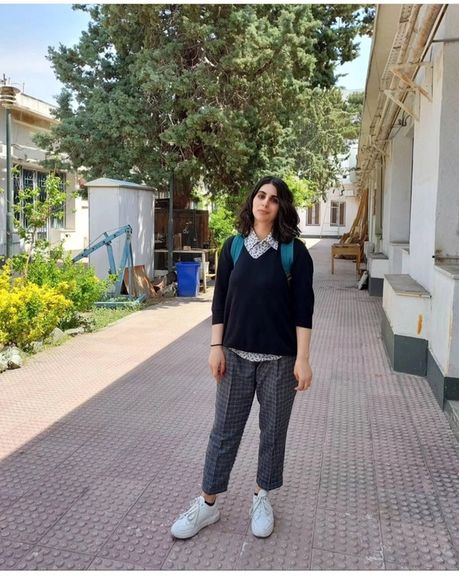
A woman who was arrested and tortured for protesting against hijab rules in Iran has been punished by her university with two semesters suspension.
Sepideh Rashno, 28 has been suspended from Alzahra University in Tehran due to "non-observance of the Islamic hijab", she revealed on her Instagram account on Saturday.
She had been told to "go on leave for two semesters" but refused and so was suspended.
"As a citizen, I have the right to choose the clothes I wear,” she wrote in response to the decision, adding that she plans to return to the university after her suspension with “her preferred outfit.”
The artist and writer was arrested in July after a heated dispute with a hijab enforcer on a city bus. A video of the clash she posted on social media went viral.
She was tortured into a confession and condemning other activists, and also forced to express her regret both for the confrontation with the hijab enforcer and for posting the video.
Rashno was found guilty of “association and collusion with the intention of committing a crime against the country's security through communication with foreigners and propaganda activity against the Islamic Republic and encouraging people to commit corruption and prostitution" and “propaganda against the Islamic Republic” and given a five-year suspended jail sentence in December.
Her courageous stance follows the death of Mahsa Amini, 22 in September last year while in custody for breaching hijab rules. Her killing sparked nationwide protests which are still ongoing.
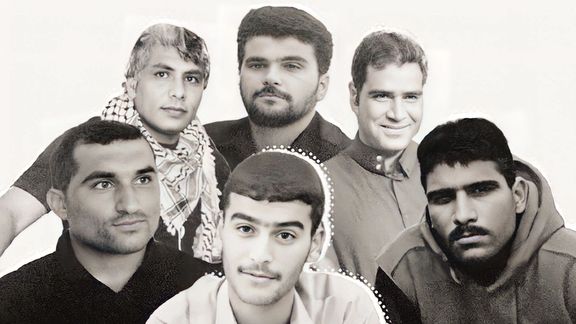
Amnesty International has urged Iran to drop the imminent execution of six ethnic Arab men and three other prisoners whose gave “tortured-tainted” confessions.
The international rights body said the prisoners arrested in the oil-rich Khuzestan province had been denied their right to a fair trial and their detention is “arbitrary”.
The execution of Adnan Ghobeishavi, 25, Moein Khanfari, 28, Mohammad Reza Moghaddam, 29, Salem Mousavi, 39, Habib Deris, 42, and Ali Majdam, 43 could take place at any time after a Supreme Court ruling on March 6 upheld the sentences against them.
In a separate tweet Amnesty International also voiced concern over the fate of three other detainees in Esfahan.
“Majid Kazemi, Saleh Mirhashemi and Saeed Yaghoubi are at imminent risk of execution at central Esfahan prison (also known as Dastgerd prison) after Iran’s Supreme Court upheld their unjust convictions and death sentences in early May 2023.”
After nationwide anti-government protests last year, which is still not fully contained, the Iranian regime has embarked on a wave of executions that has seen dozens hanged this year. Activists are concerned that the executions aim to intimidate the population from further protests.

The regime used overwhelming force and military weapons to kill more than 500 civilians during the protests. Hundreds of others received permanent bodily injuries, including loss of eyes because of shotgun pellets fired at the faces of protesters. More than 20,000 were arrested.
The London-based human rights watchdog said on May 12 that the six should have access to their families, lawyers and adequate medical care pending their release.
“Their group trial was grossly unfair. The men were denied lawyers of their own choosing and were never allowed access to their court-appointed lawyer, even at trial. The authorities have barred them and their lawyer from accessing their casefile and verdict,” Amnesty said.
According to the report, the men's "torture-tainted" confessions were used by the Revolutionary Court in Ahvaz to sentence them to death on February 14 on the charge of "waging war against God" following the armed operations conducted by a separatist group in which members of the security forces were killed.
Amnesty said that the men, who have denied the charges, were neither allowed lawyers of their own choosing nor access to their court-appointed lawyers during trial, and that the authorities prevented them from seeing their case files and verdicts.
IRGC agents subjected one of the detainees to "sleep deprivation, waterboarding, electric shocks, beatings, and hanging upside down while submerging his head in water," according to the group.
Amnesty expressed concern that three other Iranian men are at imminent risk of execution in Isfahan after the Supreme Court affirmed their "unjust" convictions earlier this month.
Since late April, at least 60 people have been executed across the country for charges that under international law should not result in the death penalty, according to the New York-based Human Rights Watch (HRW).
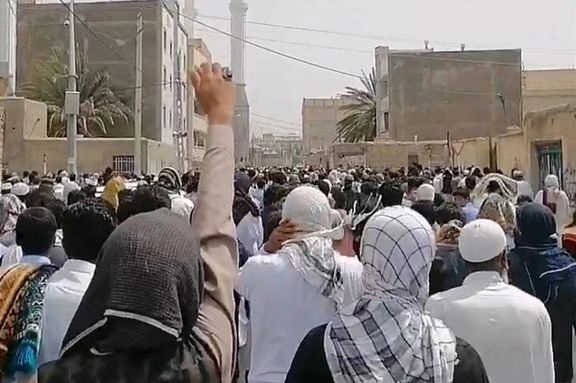
Influential Sunni cleric Mowlavi Abdolhamid says with engineered elections, the regime has barred competent individuals from positions of power and weakened the country.
Abdolhamid accused the regime of allowing only incompetent people to be elected to the parliament, presidency and as constitutional watchdogs whose job is to supervise the supreme leader and to elect his successor. “Worthy and competent individuals,” he said, cannot be chosen in the kind of elections that the regime holds.
Abdolhamid who has gained huge popularity for his fiery Friday sermons since protests began in mid-September warned that methods employed by the regime, and the exclusion of capable individuals, has resulted in people’s dissatisfaction and fuelled recent protests.
He went on to say that the Iranian people wish the same prosperity and development for their country that freely elected leaders bring elsewhere in the world.
Over the years, the hardliner Khamenei-appointed Guardian Council has tightened its control over the election process. In the presidential elections of 2021, the council disqualified the long-time regime loyalist and moderate conservative, former Parliament Speaker Ali Larijani to ensure hardliners seize the presidency. Already, in 2020, by disqualifying hundreds of candidates, the Guardian Council allowed hardliners to gain a strong majority in parliament.
“We hear that some people are making plans for future elections. [These could be the type of] elections that people don’t want. The people want free elections. They want to elect people who are capable and strong executives with the power to make [their own] decisions,” he told his congregation in Zahedan this Friday.
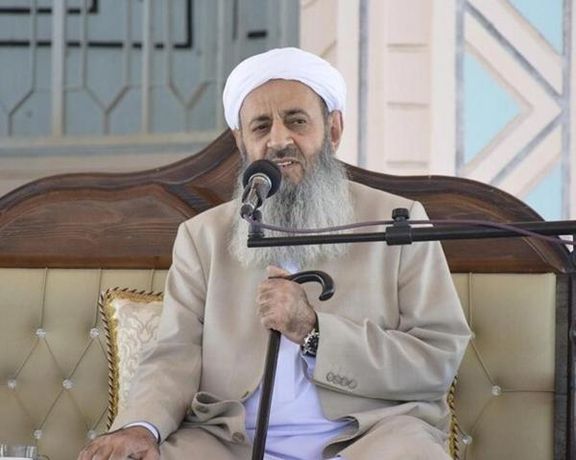
“We have not been able to use capable people and competent executives. Weak lawmakers weaken the parliament, and such weak parliaments are unable to manage the country at times of crisis,” he said. “You are doing injustice to this country by entrusting the work to a weak government and president,” he added.
Abdolhamid also called for a new constitution. “Stop [enforcing] the laws that have not worked until now. Why should we stick to something that was ratified forty-four years ago? He asked.
The parliamentary elections of March 1, 2024, has great importance to the regime which has always relied on high turnout of the electorate as proof of its legitimacy.
However, after last years’ several-month-long protests, the chances of anything other than elections with a very low turnout are quite slim as those who protested, and their supporters, and even many Islamic Republic loyalists, have long vowed never to run or vote in any election again.
Apart from the 290 members of the Iranian parliament, voters must also choose 88 members of the Experts Assembly in the March elections.
Some pundits claim turnout in the 2024 elections may be as low as 15 percent. The turnout in the highly engineered elections in 2020 which resulted in a hardline majority in the parliament was the lowest ever in the history of the Islamic Republic.
In the capital Tehran just over 26 percent voted in 2020 but according to government figures, national turnout stood at over 42 percent. In the 1996 parliamentary elections 71 percent had voted.
Hardline media such as the Revolutionary Guards (IRGC) linked Tasnim claim that Larijani is going to run in the elections with his own slate which the former President Hassan Rouhani is going to support.
Rouhani has neither confirmed nor denied his intention to get involved in the upcoming elections but Larijani’s office in a statement Monday denied Tasnim’s report. The statement said there was no talk of any election activity, consultation with others, or an electoral list.
Taking a jab at hardliners in power, the statement said those who are after excluding others should not worry about Larijani running in the elections and that it is not likely to create an atmosphere of “fake competition” with false news about rivals’ intention to run.